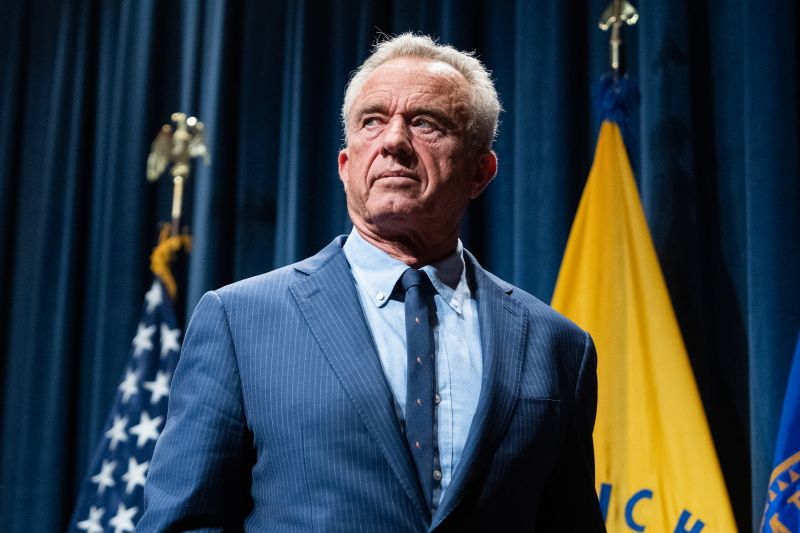Alison Singer has a few people she’d like Robert F. Kennedy Jr. to meet.
Singer’s brother and daughter are two of the millions living with autism in the United States, and part of a much larger community that has very publicly expressed feeling hurt and disrespected by the US Health and Human Services secretary’s description of who they are and how they live.
“He clearly doesn’t understand either one of them,” said Singer, the president of the Autism Science Foundation.
Singer’s daughter lives and works on a farm where she takes care of animals and grows and sells crops, and her brother lives in group home where he delivers meals on wheels to homebound senior citizens, she said. They’re both loving individuals who are active members of the community and family, she said.
But Kennedy “made it sound like these were people whose lives were worthless, when that couldn’t be further from the case,” Singer said.
At his first news conference as head of HHS, Kennedy said this week that the rising rate of autism in the country is an “individual tragedy” and “catastrophic for our country.”
A new report from the US Centers for Disease Control and Prevention found that autism rates in 8-year-olds in the US rose from 1 in 36 in 2020 to 1 in 31 in 2022. The increase continues a long-term trend that experts have largely attributed to better understanding of and screening for the condition.
But Kennedy has rejected that concept, instead pushing the idea that autism is “preventable” and part of a “chronic disease epidemic” that “destroys” children and families.
“These are kids who will never pay taxes. They’ll never hold a job. They’ll never play baseball. They’ll never write a poem. They’ll never go out on a date. Many of them will never use a toilet unassisted,” Kennedy said Wednesday.
People with autism, their families and advocates were quick to refute Kennedy’s comments.
Dr. Peter Hotez, dean of the National School of Tropical Medicine at the Baylor College of Medicine, is a vaccine researcher who has an adult daughter with autism whom he wrote a book about.
“My adult daughter Rachel, works everyday, pays taxes, has friends, loves going to the movies, and listens to lousy (IMO) music. She has a meaningful and thoughtful life,” he wrote in a social media post on Thursday. “Our U.S. Dept of HHS has lost all of its humanity, compassion, and intellectual curiosity.”
Many advocates and researchers alike say that Kennedy’s narrow description of autism – his characterization of both the science and the experience of what living with it can be like – is reductive and harmful.
Kennedy’s rhetoric sets the US back at least a decade to a time rife with damaging stigma around autism that the community has fought hard to change, said Zoe Gross, director of advocacy at the Autistic Self Advocacy Network – one of a group of leading autism advocacy organizations that released a joint statement on Thursday about these concerns.
“He set up this litmus test of what it is to be a person and have a valuable life,” said Gross, who is autistic. “It’s not acceptable to talk that way anymore because of the work that we’ve done.”
In a social media post on Friday, leadership from technology company Aspiritech championed dozens of people on the team – more than 90% of whom have autism, they say – and highlighted ways that their tax-paying employees directly contradict the picture Kennedy painted of autism.
“We’d like you to meet 100 people who will help dispel the many misconceptions about autistic people that seem to be driving a false narrative,” the company wrote, inviting Kennedy to visit its offices in Chicago. “We’d like to talk to you about how the idea of a cure feels like you don’t want autistic people to exist. Autism is a birth-to-death condition, and many diagnosed autistic people view it as a critical piece of their identity.”
Autism spectrum disorder, or ASD, refers to a broad range of neurodevelopmental conditions characterized by challenges with communication skills and social skills. People with autism “may behave, communicate, interact, and learn in ways that are different from most other people,” according to the CDC, and “the abilities of people with ASD can vary significantly.”
Dr. Lisa Settles, director of Tulane University’s Center for Autism and Related Disorders, has spent more than 20 years in autism research and worked with thousands of patients. None of her patients have been exactly alike, but all of them have value, she said.
“To me, it’s very obvious that [Kennedy] doesn’t know a lot about the diagnosis,” she said. “He’s pulling things together into a theory that isn’t based in any ounce of science, and it’s really frustrating to those of us who are professionals.”
Kennedy later went on Fox News to “set the record straight.” He doubled down on the limitations that he says people with autism have, but clarified that he was specifically talking about the 1 in 4 people with autism who have “severe autism.”
A CDC report from 2023 shows that about 27% of 8-year-olds with autism were considered to have “profound autism,” defined as children who were nonverbal, were minimally verbal or had an intelligence quotient (IQ) less than 50. That report analyzed data from 2000 to 2016.
The latest CDC report did not include an analysis using this criteria. But other data on the cognitive level of children with autism contradicts Kennedy’s claim that “most cases now are severe,” or that these cases are driving the rise in prevalence. CDC data from 2022 shows that about 40% of 8-year-olds with autism had an IQ of 70 or less, up less than 2 percentage points from 2020 when about 38% did.
Early diagnosis of autism is easiest in children who have greater support needs, experts say.
“We see them because they’re not meeting their developmental milestones,” Settles said. “They have speech delay or total lack of speech, so those are going to be the kiddos that are picked up diagnostically first.”
But some kids with autism who have lower support needs might continue to meet developmental milestones until age 8 or later, and those cases would be missed in the data that CDC is analyzing, she said.
Advocacy groups over the years have worked to raise awareness to help parents and others understand what their child might be experiencing and seek out a diagnosis.
“If the more severe cases are going to be the ones that are brought to your attention earlier, then it may look like the severe cases are increasing. But if you look overall, it’s really that we diagnose just as many kids with a level one as we do a level three,” Settles said.
And Kennedy’s use of outdated terminology like “severe” is also not in line with current science and can have damaging negative connotations, she said.
“Clinically and professionally, we don’t use the word severe,” Settles said. “It’s really short-changing the individuals with autism, it’s short-changing the families, and it’s hurtful.”
Kennedy has launched a “massive testing and research effort” at HHS to determine the cause of the “autism epidemic,” promising some answers as early as September. There are differing opinions in the autism community about the importance of searching for a cause when limited resources may be better spent understanding how to build support for people living with autism. But there’s broad agreement that Kennedy’s laser focus on environmental toxins is problematic, especially if he continues question science that has already proven that vaccines do not cause autism.
“This was the most exciting time in research. Things that we thought five years ago sounded like science fiction were actually happening,” Singer said. “All that is now under threat to be derailed in favor of more research on vaccines.”
And advocates emphasize that even if most people with autism can do the things that Kennedy said they can’t, those who may need more support deserve more respect.
“If someone can’t do any of those things because of their disability, it doesn’t mean they can’t have a good life,” Gross said. “They deserve better than being a rhetorical prop.”

